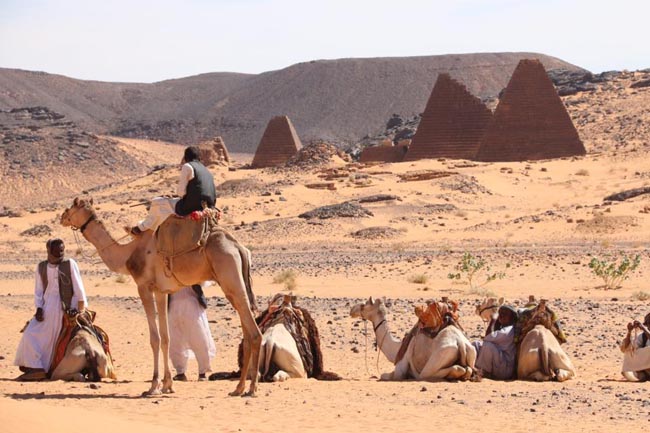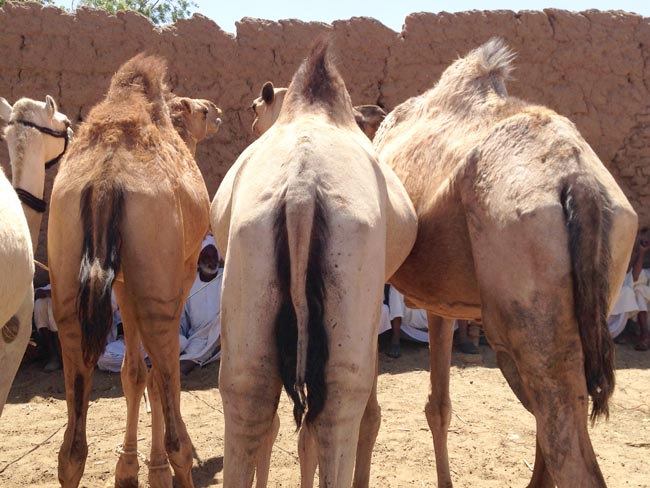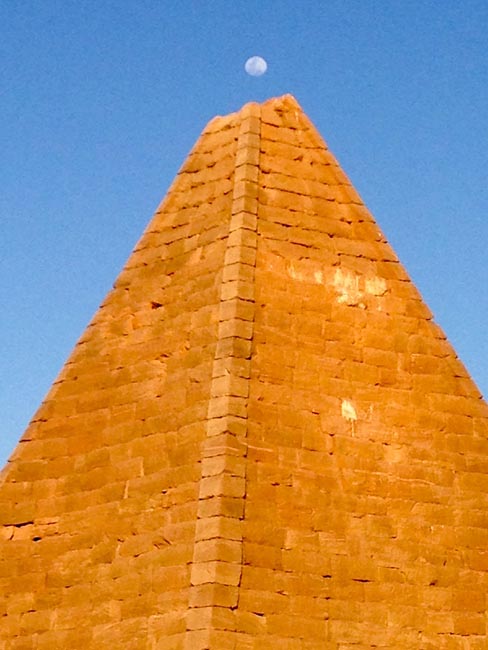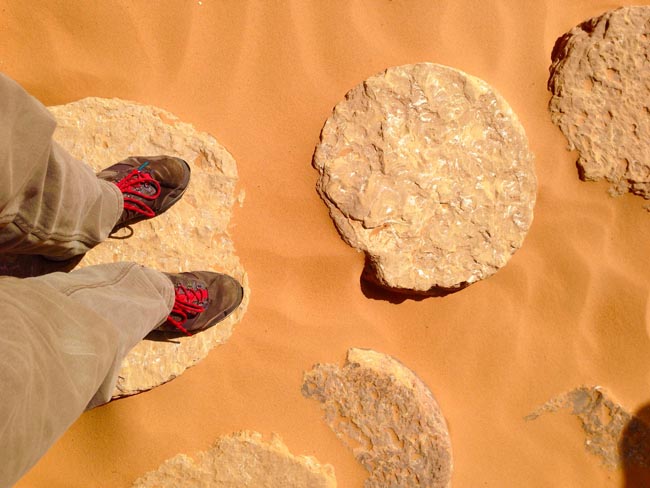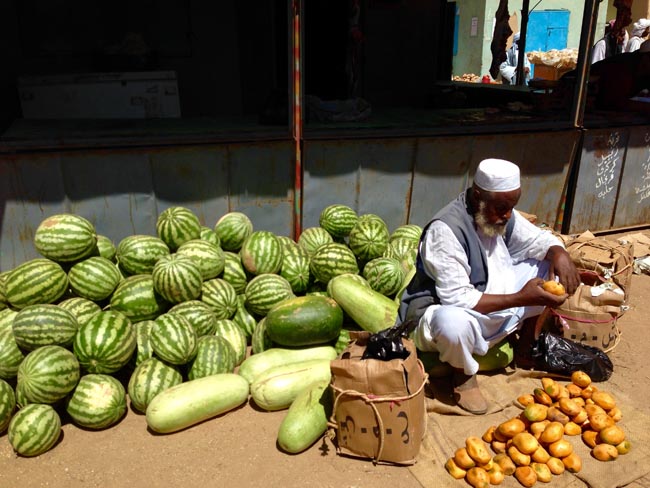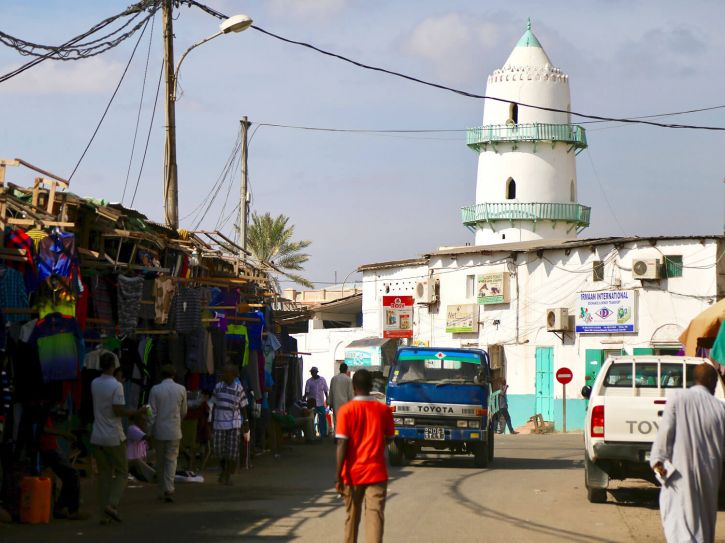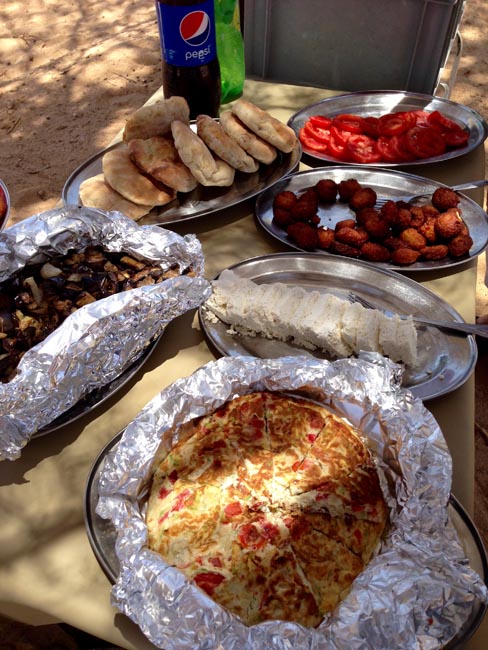This bold and unique new adventure travels the road MUCH less travelled, to three fascinating and friendly neighbours with much to offer the intrepid traveller. Northern Sudan enjoys good roads, security and stability, and some of the most dramatic, yet least- visited archaeological sites in the world--more pyramids than Egypt! Our European hosts own their own vehicles, accommodation outside the capital, and ensure top quality service and comfort well beyond expectation. Djibouti is touted as "Africa's Dubai," and is regarded as a major up-and-coming destination with much to see and experience. And our foray into Ethiopia covers a unique corner of the country not covered on our regular tours of the country.
This tour will be led by our most senior Tour Leader, Victor Romagnoli, who has travelled extensively in the region and will ensure an incredible, once-in-a-lifetime travel experience.
For additional dates for 2017, please refer to tour code SD1
Download Itinerary
Day 1 Arrival in Addis Ababa
Arrival at Addis Ababa Airport. Welcome to Ethiopia!
Overnight in Addis Ababa.
Included Meal(s): Dinner
Day 2 Khartoum: City Tour & Dervish Ceremony
This morning we start our Khartoum city tour.
First will be a visit to the Archaeological Museum, which features, among other things, two beautiful temples rescued by UNESCO and moved from the Lake Nasser area when it was flooded in the 1970's. We then cross the confluence between the Blue Nile and the White Nile near the Presidential Palace where, in 1885, General Gordon was beheaded by the Mahdi's troops. Later we reach Omdurman, the old capital of Sudan, where we see the Mahdi's Tomb from outside.
In the afternoon we will visit the interesting Khalifa's House (possibly closed for renovation) which holds a small museum about the Mahdyia. We then visit the colourful souk of Omdurman where we experience a large, colourful and lively local market and interact with the friendly locals.
Just prior to sunset we will head to the tomb of the Sufi leader, Ahmed al Nil, in order to observe the Sufi Dervish Ceremony, held only on Fridays. This is not the 'formal' kind of ceremony that one may have seen in Turkey with actual whirling as such, but rather a very casual and informal "dancing" and moving to beat-driven music. The atmosphere is celebratory and the locals get involved and vistors are made to feel very welcome.
After sunset we will return back to the center of Khartoum for dinner and overnight.
Overnight in Khartoum.
Included Meal(s): Breakfast, Lunch and Dinner
Day 3 Khartoum - Karima
This morning we begin the journey northward through the Western Desert. We travel in a flat desert where the view can span 360° around and we reach Wadi Muqaddam with its many acacia trees.
En route we'll make rest stop at the "chai houses," literally tea houses, a Sudanese version of a truck stop in the desert where local truck drivers usually stop for a quick meal and some rest. In the afternoon we arrive in Karima, where we check in at the charming Nubian Rest House at the foot of Jebel Barkal, the holy mountain of the old Egyptian and Nubian Pharaohs
The Nubian Rest House: Karima is a small town located on the right bank of the Nile, close to the famous archaeological site at Jebel Barkal, south of the 4th Cataract. The town is a small, dusty, and quiet village where a big market takes place in the morning. The Nubian Rest House is a charming small hotel built in the typical Nubian style, surrounded by a large private enclosure, a nice garden, and leisure area. Each of the 22 A/C rooms is characterized by a typical Nubian door with its own private bathroom and a pleasant veranda. A reception area, restaurant, and lounge with decorated walls complete the wonderful setting. All the buildings are made with local bricks covered by hand-spread clay plaster as used in the area. The hotel is Italian-managed with the help of well-trained Sudanese staff.
Overnight in Karima.
Included Meal(s): Breakfast, Lunch and Dinner
Day 4 Karima: Jebel Barkal & the Necropolis of El Kurru
A landmark in the Nubian Desert, Jebel Barkal ("Jebel" means mountain in Arabic) can be seen from several kilometres away. At the foot of this wonderful and isolated red sandstone mountain, considered holy since the ancient times, stands a large temple dedicated to the Pharaohs of the New Reign and to their patron, Amon. Amon's ancient "Pure Mountain", the Olympus of the Nubians, was the religious Nubian heart for more than 1,000 years. Besides the ruins of the big temple, there are still several sculpted granite rams that were supposed to border a long avenue that probably led to the pier on the Nile. In the mountain wall there is a large room decorated with bas-relief.
The Jebel Barkal archaeological sites are listed on the UNESCO World Heritage list. The royal necropolis of the ancient city of Napata, the Nubian capital (from 800 to 400 BC) before the Meroitic period, had a large number of pyramids located in three different places: a few hundred metres north of Jebel Barkal; a dozen kilometres southwards from the holy mountain, in El Kurru; in Nuri, located on the other bank of the Nile.
After lunch we will travel southwards to the village of El Kurru where we find one of the necropolises of the ancient capital, Napata. Here we can visit one tomb, which is excavated in the rock under pyramids -- partially collapsed -- and totally decorated with images of the Pharaoh, the gods, and multicolour hieroglyphic inscriptions. Not far from here there is an interesting site of petrified wood, an ancient forest with hundreds of huge trunks.
In the late afternoon we return back to Karima.
Overnight at Nubian Rest House.
Included Meal(s): Breakfast, Lunch and Dinner
Day 5 Karima & Old Dongola
Today is a full day full of interesting encounters and visits. Early in the morning we will follow the Nile until we reach the archaeological site of Old Dongola. Here we discover the ruins of a Christian Coptic temple with marble columns as well as the ruins of several churches situated on the banks of the Nile.
This area is the central part of the Nubian region. Here the population lives in small villages amongst yellow sand dunes and palm trees, and they speak a different language from the Arabs. Here Islam is not as "strict" as in other regions of Sudan; many women don't cover their faces, and they are often more willing to speak with foreigners. Some houses in the Nubian villages are painted with patterns of flowers, but most of them are completely white.
Return to Karima.
Overnight in Karima.
Included Meal(s): Breakfast, Lunch and Dinner
Day 6 Karima - Bayuda Desert - Meroe
Today we depart Karima and continue our journey south to Meroe via the Bayuda Desert.
The Bayuda Desert is an area bounded by the loop formed by the Nile between the 4th and the 6th Cataract and characterised by sharp black basalt mountains, most of them volcanic and typically cone-shaped. They alternate with level pebble stretches and large valleys crossed by dry wadis where only little vegetation survives and gazelles can sometimes be seen. We are likely to meet isolated groups of Bisharin nomads, who live in family groups in small huts made of intertwined branches close to the rare water wells, with their caravans and herds of camels and donkeys.
In the first part of the crossing we drive among sand dunes. After a few kilometres on the asphalt road, the adventure continues as we follow the Wadi Abu Dom, driving on a sandy track among many acacia trees and some wells where it is possible to meet nomads.
Suddenly more than 40 pyramids located on top of a hill come into view, some of them perfectly-preserved. This is the Royal Necropolis of Meroe. We'll stop a distance away to enjoy the view and for photos before arrival at the Meroe Camp, also with a beautiful view of the pyramids.
THE MEROE CAMP
Meroe Tented Camp is located in Bagarwyia, (about 230 km north of Khartoum) overlooking the beautiful pyramids of Meroe. Accommodation consists of 22 twin-bedded tents (4x4m), tastefully-furnished. Each one has its own private separate bathroom hut with shower and toilet (located a short walk from your tent). The camp is located 2 km from the Royal Necropolis. Each tent is equipped with a veranda with two comfortable chairs to relax in front of the astonishing view of more than forty pyramids. The electricity in the tents is supplied by a generator working till 11:00 pm. The camp is managed by an Italian manager with the help of well-trained Sudanese staff.
Overnight at Meroe Camp.
Included Meal(s): Breakfast, Lunch and Dinner
Day 7 Meroe - Temples of Naga & Mussawara - Khartoum
This morning we continue backward Khartoum with two important stops along the way.
We stop at Mussawarat, not far away from Naga. This settlement is located in a beautiful valley crowned by hills. Here the ruins of a very large temple are visible; it once played an exceptional important role. Its main characteristic, the "Great Enclosure" is made by many constructions and boundary walls which surround a temple built in the 1st century A.D. The large number of elephants represented on these walls makes you think that this animal used to have an important role in this area. Beyond the big wadi there is another temple -- restored by a German archaeological mission -- dedicated to the god Apedemak. Picnic in the area and then visit the site of Naga.
Naga is one of the two centres that developed during the Meroitic period. In Naga, in a typical Saharan environment with rocks and sand, we find a temple dedicated to Apedemak (1st century A.D.): a wonderful building with bas-relief decorations depicting the god with a lion's head, the Pharaoh, noblemen, and several ritual images.
A few metres away there is a small and odd construction with arches and columns, named "kiosk", in which we can notice Egyptian, Roman, and Greek styles all at the same time. Not far away we reach another temple dedicated to Amon with many statues of rams and beautiful gates decorated with bas-reliefs.
We arrive back in Khartoum in the late afternoon.
PLEASE NOTE: As most international flights from Khartoum depart late in the night, ie around of after midnight, you may not have a full night in Khartoum. We will, of course, have rooms in which you can freshen up, pack, and rest before departing for the airport.
"Day rooms" in Khartoum.
Included Meal(s): Breakfast, Lunch and Dinner
Day 8 Meroe: the Necropolis & Royal City of Meroe
This morning will be dedicated to visiting the pyramids of Meroe. The Royal Necropolis of Meroe is located at about 3 km from the Nile on some hills covered by yellow sand dunes. Several pyramids stand out with their sharp shapes against the clear sky. Each one has its own funerary chapel with the walls fully decorated with bas-reliefs that show the king's life and offerings to the gods.
In the afternoon we move along the Nile in order to visit the ruins of the royal city. Excavations that have taken place here confirm that the town of Meroe once covered a large area, and the royal city was located in a central position surrounded by suburbs and a boundary wall. Most of the area where the city is located, formed by many small hills covered by red clay fragments, has yet to be excavated.
Overnight at Meroe.
Included Meal(s): Breakfast, Lunch and Dinner
Day 9 Karima - Khartoum
Today we drive south along the tarmac road across the Western Desert. We stop for lunch in a simple "chai house" (a roadhouse where the local truck drivers stop for food and to rest) and in the afternoon we reach Khartoum for a bit of a rest before our farewell dinner.
Overnight in Khartoum.
Included Meal(s): Breakfast, Lunch and Dinner
Day 10 Khartoum, Sudan - Djibouti City, Djibouti
Today we fly to Djibouti City (via Addis Ababa on Ethiopian Airlines). Welcome to Djibouti!
Djibouti City is the capital and largest city of Djibouti, which is named after it. It is located in the coastal Djibouti Region on the Gulf of Tadjoura. Home to around 600,000 inhabitants, the city contains over 60% of the nation's population. The settlement was founded in 1888 by the French, on land leased from the ruling Somali and Afar Sultans. During the ensuing period, it served as the capital of French Somaliland and its successor the French Territory of the Afars and Issas. Under its veneer of urban bustle, the city remains a down-to-earth place, with jarring cultural and social combinations. Traditionally robed Afar tribesmen, stalwart GIs, sensuous Somali ladies and frazzled businessmen with the latest mobile phones stuck to their ear all jostle side by side.
Overnight in Djibouti City.
Included Meal(s): Breakfast and Dinner
Day 11 Djibouti City - Tadjoura & Sables Blancs
Today we take a ferry across the Gulf of Tadjoura to Tadjoura and Sables Blancs.
Tadjoura is the capital of one of the six regions in Djibouti. Located in the North-Central part of Djibouti it is also known as The White City. The Sultanate of Tadjoura has many white buildings and is a historic city. It was were the French colonization started when the sultan granted a piece of land to the French. Soon Djibouti City became the most important city of the country. Nowadays it serves as an important port and a fishing place.
We'll have a bit of sightseeing around town before heading to Sable Blancs Beach for a bit of down time.
Overnight near Tadjoura.
Included Meal(s): Breakfast and Dinner
Day 12 Tadjourah - Lake Assal - Djibouti City (or Khartoum)
Today we travel by road southwest to Lake Assal, located in the North-Central part of Djibouti. Shortly after our departure from the beach area we will make a brief stop in Tadjoura - known as the 'White City.' The Sultanate of Tadjoura has many white buildings and is a historic city. This was where the French colonization started when the sultan granted a piece of land to the French. Soon Djibouti City became the most important city of the country. Nowadays Tadjoura serves as an important port and fishing settlement.
Lake Assal is a saline lake, which lies 155 m (509 ft) below sea level in the Afar Triangle, making it the lowest point on land in Africa and the second-lowest land depression on Earth after the Dead Sea. Situated in the Danakil Desert, the lake is bounded by hills on the western region. No outflow occurs from the lake, and due to high evaporation, the salinity level of its waters is 10 times that of the sea, making it the most saline in the world after Don Juan Pond, Antarctica. Salt extraction by the Afar nomad tribes of camel drivers and Issas from Lake Assal's salt bank established the ancient caravan routes. These linked the lake with the mountains of Ethiopia for barter trading such items as sorghum, coal, and other commodities. Salt was also bartered with South Abyssinia for items like coffee, ivory, musk, and also (historically) slaves. It was a source of wealth for the local tribes.
After a day of scenic stops and short walks we will continue our journey back to Djibouti City.
PLEASE NOTE: Due to changeable flight schedules, it is possible that we will need to depart Djibouti City this evening and arrive in Khartoum very early tomorrow morning. We will have hotel rooms waiting for us in Khartoum if this is the case.
Overnight in Djibouti City.
Included Meal(s): Breakfast, Lunch and Dinner
Day 13 Djibouti City, Djibouti - Dire Dawa, Ethiopia - Harar
Today we fly (direct) to Dire Dawa, Ethiopia. On arrival we travel by road to Harar (good road, 54 km).
The medieval walled city of Harar stands amid green mountains, on the east wall of the Great Rift Valley near the Somali border. Harar's heritage is almost entirely Muslim and Oriental; with its 90 mosques and shrines. Harar is considered to be the fourth most sacred center of the Islamic world. Its Islamic character is best expressed in the Grand Mosque (AL JAMI), which dominates the town. It is rightly renowned for it's intricately worked filigree jewelry of silver, gold, and amber.
This evening we will visit the town's most enduring attraction: a "hyena man show," where you can get a chance to stretch out your hands to feed hyenas by your own.
Overnight in Harar.
Included Meal(s): Breakfast, Lunch and Dinner
Day 14 Harar: Town Tour - Dire Dawa
Today we explore the walled city of Harar, with the Christian and Muslim markets, the former residence of the French author, Arthur Rimbaud, and the Harari Museum that depicts the interior architecture and decoration of the homes of the Harari people.
Harar stands on the eastern wall of the Great Rift Valley, with wonderful views of the vast Danakil Desert to the north, the fertile Harar Mountains to the west, and the cattle rich Ogaden plains to the south. Harar is the provincial capital of Ethiopia's largest administrative region, Hararge. Once fiercely religious, Harar was a forbidden city and closed to visitors until 1887 CE, when King Menelik restored central rule. Harar has much of its 16th century CE architecture and city walls still intact, and with its 99 mosques, including the 16th century Grand Mosque. Harar is unlike anywhere else in Ethiopia and has played a pivotal role both historically and contemporarily in the current excellent relations between Ethiopian Muslims and Christians.
Harar's Megalo Gugo Market is a center for beautiful baskets of woven grass, decorative wall-mats and bright shawls, as well as all the fruit, vegetables, spices and grains of the province. Harar's five gates -- the only means to enter or leave the city center -- have been guarded over the years. One of the gates of the city happens to be the impressive 'Shawa Gate', which for centuries served as a bridgehead for the entry of Islamic ideas into Africa from the nearby Arabian Peninsula.
This afternoon we drive back to Dire Dawa.
Overnight in Dire Dawa.
Included Meal(s): Breakfast and Dinner
Day 15 Dire Dawa - Awash National Park
Today we travel by road (+/- 4 hours, good road) to Awash National Park, located in the northern part of the Great Rift Valley at the point where the rift widens out into the Afar depression. This National Park was the first to be established in Ethiopia mainly on advice given by UNESCO on account of the great numbers and varieties of wild mammals and birds.
While in the vicinity, we'll make a foray into the park with the hope of seeing some African wildlife and to enjoy the unique topography and vegetation.
Overnight at Awash (lodge accommodations).
Included Meal(s): Breakfast, Lunch and Dinner
Day 16 Awash National Park - Addis Ababa
Today we travel by road to Addis Ababa (2-3 hours, good road). On arrival we may accomplish some of our sightseeing program in Addis, Ethiopia's sprawling capital in the highlands bordering the Great Rift Valley and the country's commercial and cultural hub.
Overnight in Addis Ababa.
Included Meal(s): Breakfast and Dinner
Day 17 Addis Ababa: City Tour - Evening Departure
This morning we tour Addis Ababa, with a visit to Ethiopia's National and Ethnographic Museum. One of its most famous residents is Lucy, a proto-human skull discovered in Ethiopia in 1974 and believed to be 3.5 million years old. The Ethnographic Museum, on the university campus of Addis Ababa, displays many items important to daily life in rural Ethiopia. A brief section also pertains to the life of the late Haile Selassie, Ethiopia's last emperor, crowned in 1930.
We also visit the Holy Trinity Cathedral, the second most-important place of worship in Ethiopia and the final resting place of Emperor Haile Selassie.
This evening transfer to the airport to connect with homeward flights (most international flights northward from Ethiopia depart late in the evening). Please note: if your departure is later in the day (many flights leave Addis near midnight), you may choose to book / pay for an extra night so that you have access to a room to rest and refresh prior to your departure (we have checked out of our hotel this morning)
LAND ONLY PASSENGERS PLEASE NOTE: If your chosen flight departs earlier in the day, you can either forfeit today's sightseeing or book an extra night in Addis at an added cost and fly tomorrow. Dinner is included if your flight time allows it (your transfer is not included, but your Tour Leader can assist).
BON VOYAGE!
Included Meal(s): Breakfast and Dinner
Inclusions
Breakfast and dinner daily; most lunches (most will be picnic lunches). Bottled drinking water provided. All transport (including internal flights), accommodation, sightseeing and entrance fees for sites noted as 'visited' in the detailed itinerary. Gratuities for drivers, restaurant staff, porters (where available), local guides. Airport transfers for land & air customers and for early arrivals / late departures if extra accommodation is booked through us.
Exclusions
International airfare to/from the tour. Tour Leader gratuities, some lunches, drinks (other than water, tea / coffee), personal items (phone, laundry, etc), domestic and international (if applicable) air taxes, visa fees*, and any excursions referenced as 'optional' (ie Red Sea snorkeling and / or Whale Shark viewing, payable locally). Airport transfers for Land Only customers. Optional trip cancellation insurance (you are required to be medically insured). Our post-reservation trip notes offer further guidance on shopping, not included meals, visas and locally-paid departure taxes.
LAND ONLY CUSTOMERS: If you are booking your own flights, please note that due to visa-on-arrival procedures in Khartoum, meet & greet / hotel transfers at an extra cost are mandatory.
* Sudan visa: US$135 in advance (we bill you); plus US$100 (for Canadians) US$150 for USA passport holders) cash on arrival in Khartoum
Djibouti visa: Available on arrival for US$90 / Euro 70
Ethiopia visa: NOT available at the land border; you must apply in advance (fee applies)
More detail on visas provided upon reservation.
Seasonality and Weather
This tour is planned for the coolest and most comfortable time of the year in the entire region. That said, we will still encounter dry heat and humidity near water and at lower elevations. Rainfall is unlikely.
For additional dates beyond 2016, please refer to tour code SD1
Transport and Travel Conditions
This tour visits the safe areas of Northern Sudan which enjoys good security and stability (we do not visit South Sudan). Our local partners at destination own and operate our accommodations and vehicles outside of Khartoum and take security very seriously. That said, we encourage travellers to review DFAIT (Canada) and US Dept of State websites for more information. There are no government travel advisories for Djibouti or Ethiopia.
City tours in Khartoum, Djibouti City, and Addis Ababa are conducted by a single touring coach / bus; elsewhere, our ground transport will be provided by multiple, modern and spacious, air-conditioned Toyota Landcruiser 4x4 vehicles (or similar). Most roads travelled in Sudan are paved, though some are in rough shape and there may be some unpaved stretches. Roads in Djibouti and Ethiopia are mixed paved and unpaved, and some sections are rough and dusty (please refer to the tour itinerary for more detail).
We have rated this tour a "Level 2" largely because the length of some travel days, the rough roads, the heat and dust, the basic nature of some accommodation (baggage handling not available), and the remoteness of locales visited. This is an ambitious adventure that requires a sturdy constitution, flexibility, and a spirit of adventure.
Am I suitable for this tour? Please refer to our self-assessment form.
Accommodation
Our hotels in all three capital cities are clean and comfortable, Western-style and modern 4-5 star properties. Elsewhere, our accommodation is surprisingly comfortable and atmospheric (click on 'Map & Hotels' tab for more information. Lake Abbe accommodation is of a simpler standard, but still quite charming. All feature private bathroom facilities (with the possible exception of some rooms at Lake Abbe).
Due to the nature of accommodation in some locations in Sudan, we limit the number of single supplements to 2. If you'd like to pay a pro-rated single supplement that guarantees single accommodation in Khartoum, Djibouti & Ethiopia, but sharing for the remaining 6 nights in Sudan, please contact us.
Staff and Support
Tour Leader throughout (this tour will be led by senior Tour Leader, Victor Romagnoli, who has visited the area in the past). Local guides will also accompany in Sudan, at various locations in Djibouti, and in Harar and Addis Ababa. Local expert and highly experienced drivers in all locations.
For dates beyond 2016, please refer to tour code SD1.
Group Size
10-14 plus Tour Leader
Regions visited: East Africa
Countries visited: Sudan; Djibouti and Ethiopia
*The red tour trail on the map does not represent the actual travel path.
The following is a list of sample hotels at some locations included on this tour. The hotels shown here are meant to provide a general sense of the standard of hotel we usually aim for; they are not necessarily confirmed for your chosen departure.





The rest house is tastefully decorated, starting from the original Nubian door where the guests enter the property, to the open-air lobby, to the living room where to rest or read a book. Care for details is our passion, and it is easy to understand this when you see the Rest House.











This property is the best hotel for visitors coming to Addis Ababa as tourists based on the numerous attractions near by. Tourists can visit The National Ethiopian Palace, Friendship Park, Unity park and Holy Trinity Cathedral by walk or short vehicle ride.
